Devlog 7: Writing
Hello everyone. Oak reporting in.
Time for another devlog! We're gonna talk about writing. Gamewriting, in particular. Writing for games. For Death and Taxes. Short, understandable sentences. Easy to read. They flow well. Have a good mouth-feel to them. Try saying these sentences out loud.. or read them silently in your head. Are they actually silent if they ring inside your skull? Okay, obvious existential tangent aside, writing for games is something that is challenging in many, many ways. It comes with different challenges compared to, say, writing for comic books. Or movies. Or books. Obviously.
We stress at all possible times, that Death and Taxes is a narrative-heavy or story-oriented game, and to convey that we also need to put in a lot of work to get the point across. We want to tackle subjects that may seem taboo to some, especially considering we want to portray these subjects in a fairly lighthearted manner. We want to convey a wide range of emotions, of confusion, elation, self-realization and fulfillment, too. To this end we want to put the player through a meaningful experience, which brings us to the story of the game.
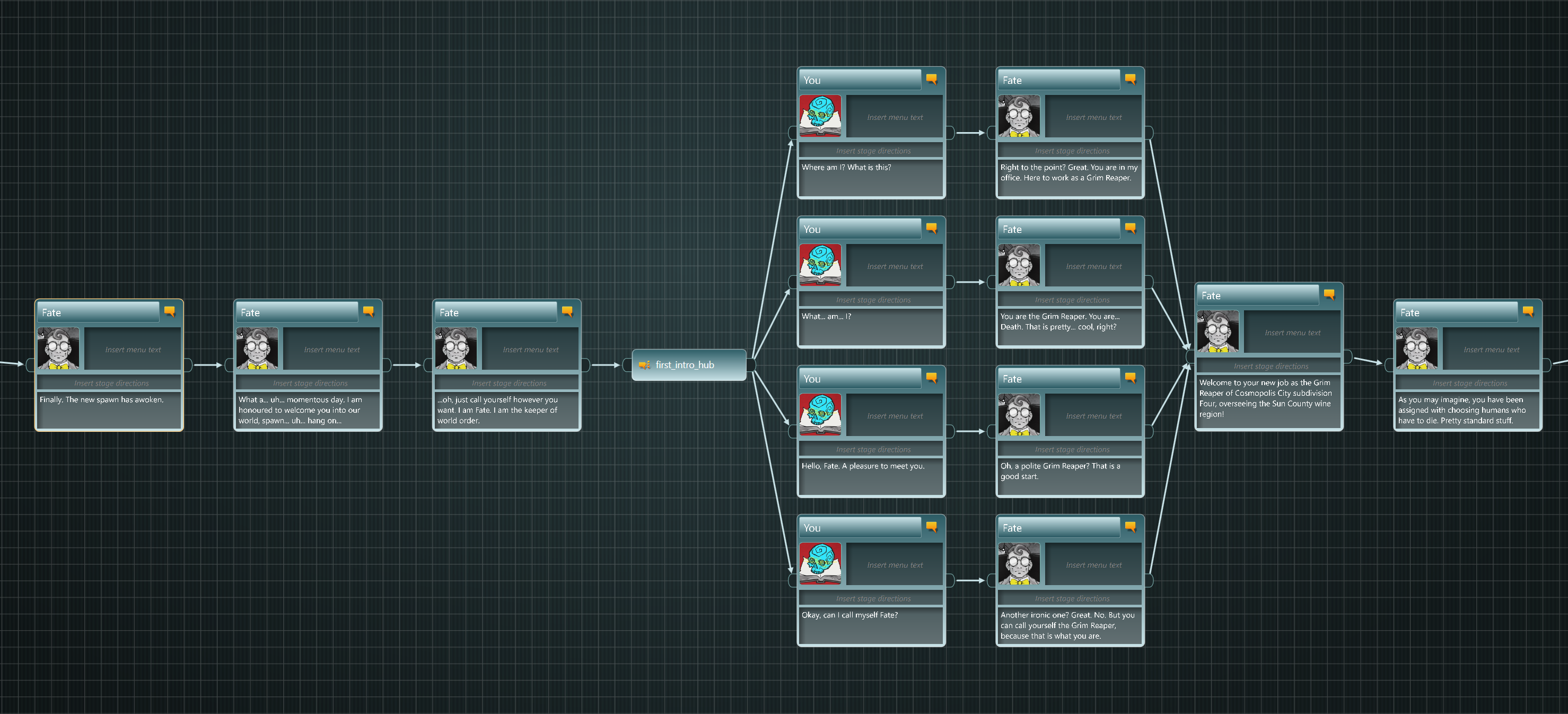
You are the Grim Reaper. Or rather, "a" Grim Reaper. One of many, of countless incarnations. As a player, you're on this rollercoaster that our writers have imagined. Sometimes you can pull a lever, and you'll be on a different part of the rollercoaster, but you're still on the track, hurtling along. We want the player to also feel like they are at least somewhat in control of the situation, but by and large, you are still the Grim Reaper at the end of the day.
The writing for the game comes in three distinct flavours.
- Day End dialogues
- Speech Bubble dialogues
- The lore and setting
Most of the content you will experience in the game will come through playing through the core loop of waking up each day, marking people who will die and talking to your boss about it. There are special cases for this, as incidental situations, which you will have to face to proceed in the game. All of your actions during these days will be taken into account when the game reaches its ending. You have 28 days to save the world, or to let it burn. You can play it again and have a different experience, based on what kind of choices you make. This is how the player can be in control of the lever I mentioned before, while still being on a rollercoaster, so to speak.
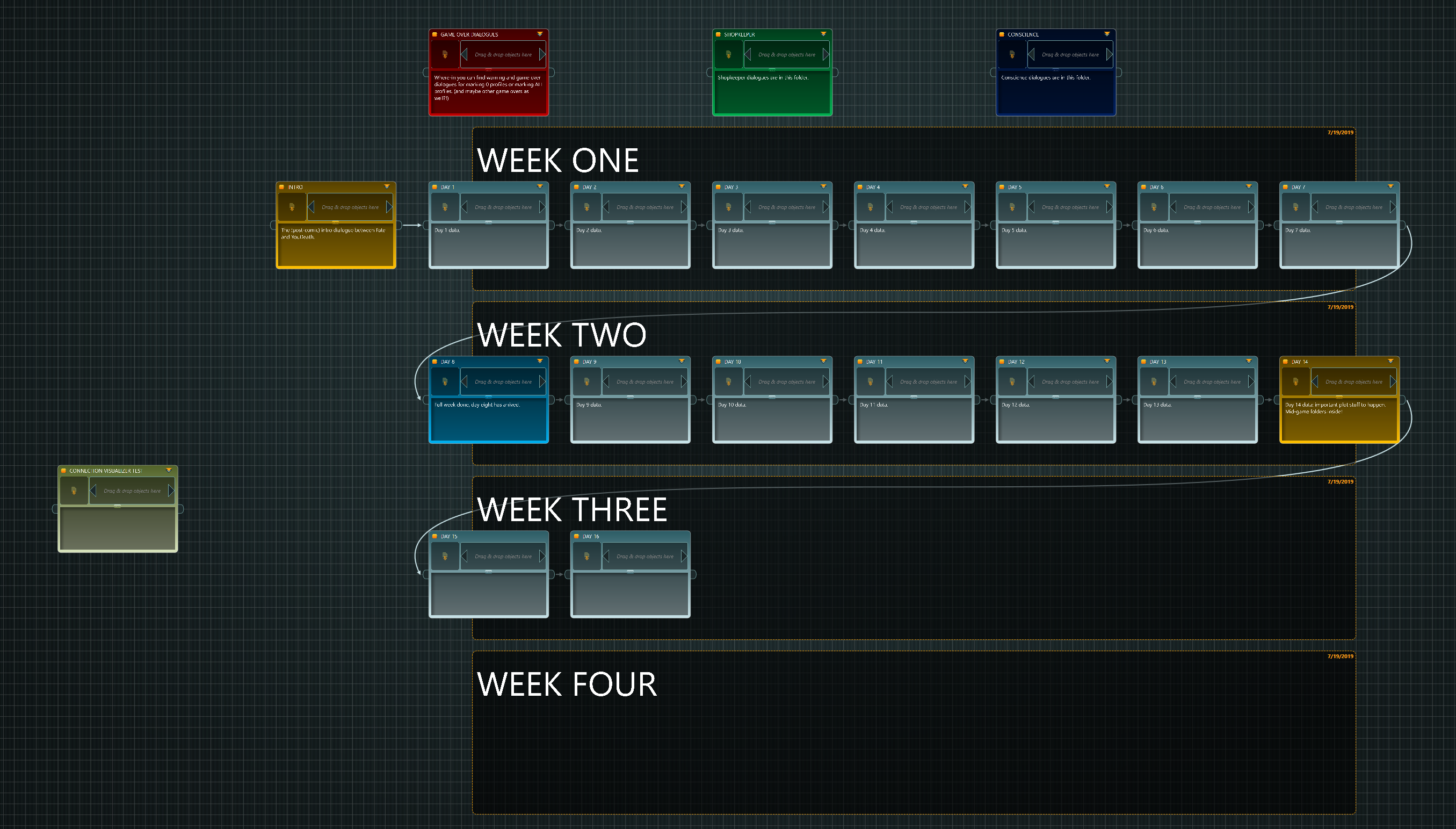
This is what the game's core narrative layout looks like currently, as it is a work in progress. I bet you're already asking yourself: what kind of weird screenshot are these? Where's the game? We decided to use an external tool for our writing, called articy:draft 3. Some people in the team, like myself or our main writer Märten, have used this tool before to great efficiency. To help with narrative design and structure we decided to go with something familiar. If you're interested in what kind features this toolkit gives you, check them out here. It saves us a lot of time compared to just doing things in text files or Google Docs.
We use it to give our project a definitive data model, which we can then import into Unity (using their neat plugin). We keep most of the data about the game in our Articy project, and all the behavioural logic in-engine, in Unity. This helps us to organize our work better and also have well-crafted structures (haha, well, mostly well-crafted >_>) to ease our workflows. In practical terms it means that Märten crafts the data model inside Articy, fills it with brilliant writing, I import it into Unity, and bam, we're all set to go. Until we need to make changes to the system, in which case we discuss and deliberate, bring in the changes and then do another import. This can happen quite often. And this is exactly why having a good toolkit is helpful - it reduces the time spent on trying to reinvent the wheel.
In the game, you will mainly see these kinds of data structures, the humans' profiles that you have to work through:
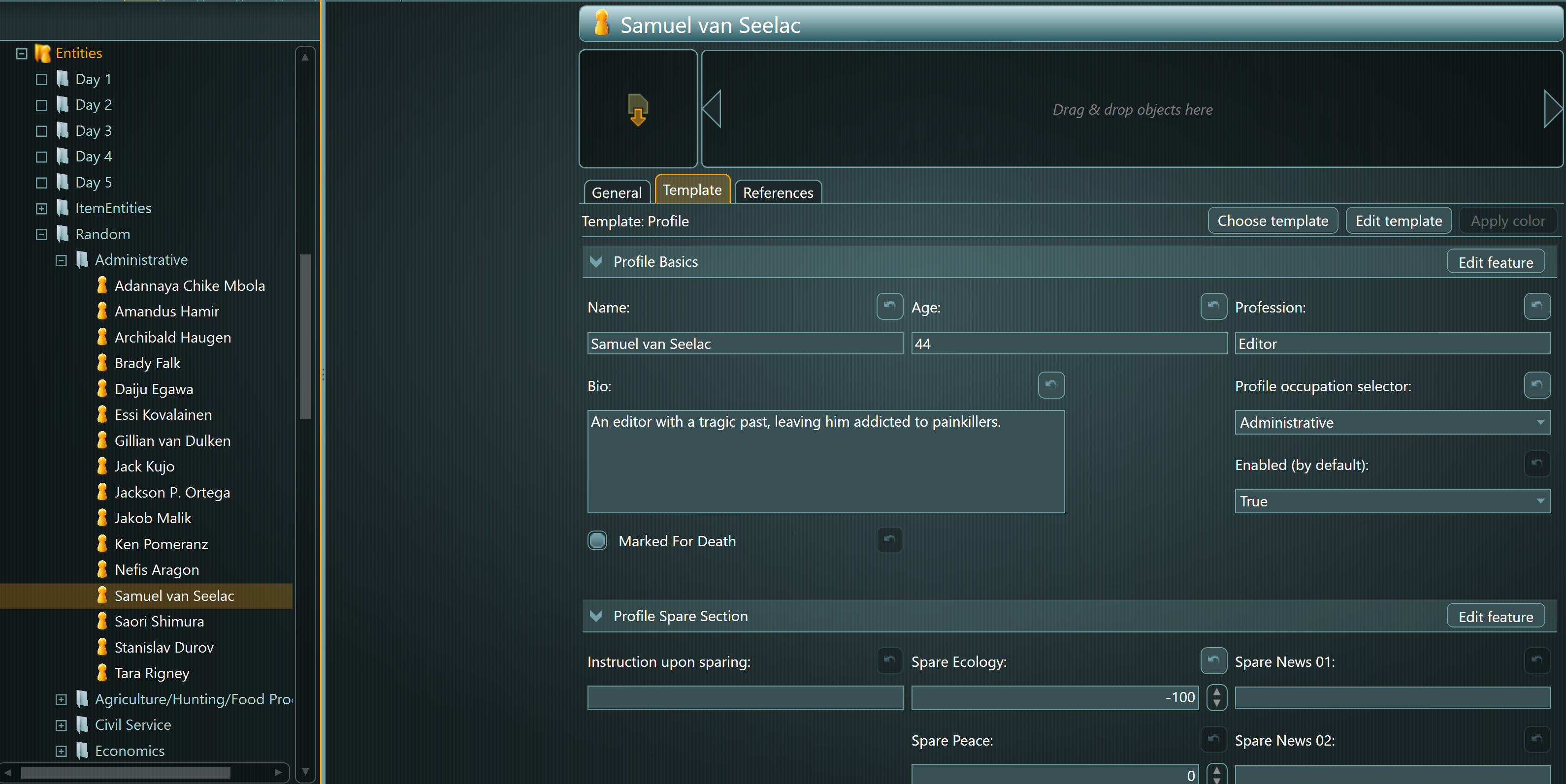
In-game, they look something like this:

And yes, I do realize that the Articy profile and in-game one don't match here but I just had the idea of including an in-game profile just now as I'm writing so bear with me ok :D
ANYWAY. In addition to that, there is more content to be found in items that you can collect. As a good Grim Reaper, good Grim Reapers get paid. In darksouls. That's the currency in the afterlife, yes. It's spooky. And useful. You can collect these to give you more information about your job and how you are doing, to customize your appearance or just to decorate your desk or personal room.
Like a magic mirror.
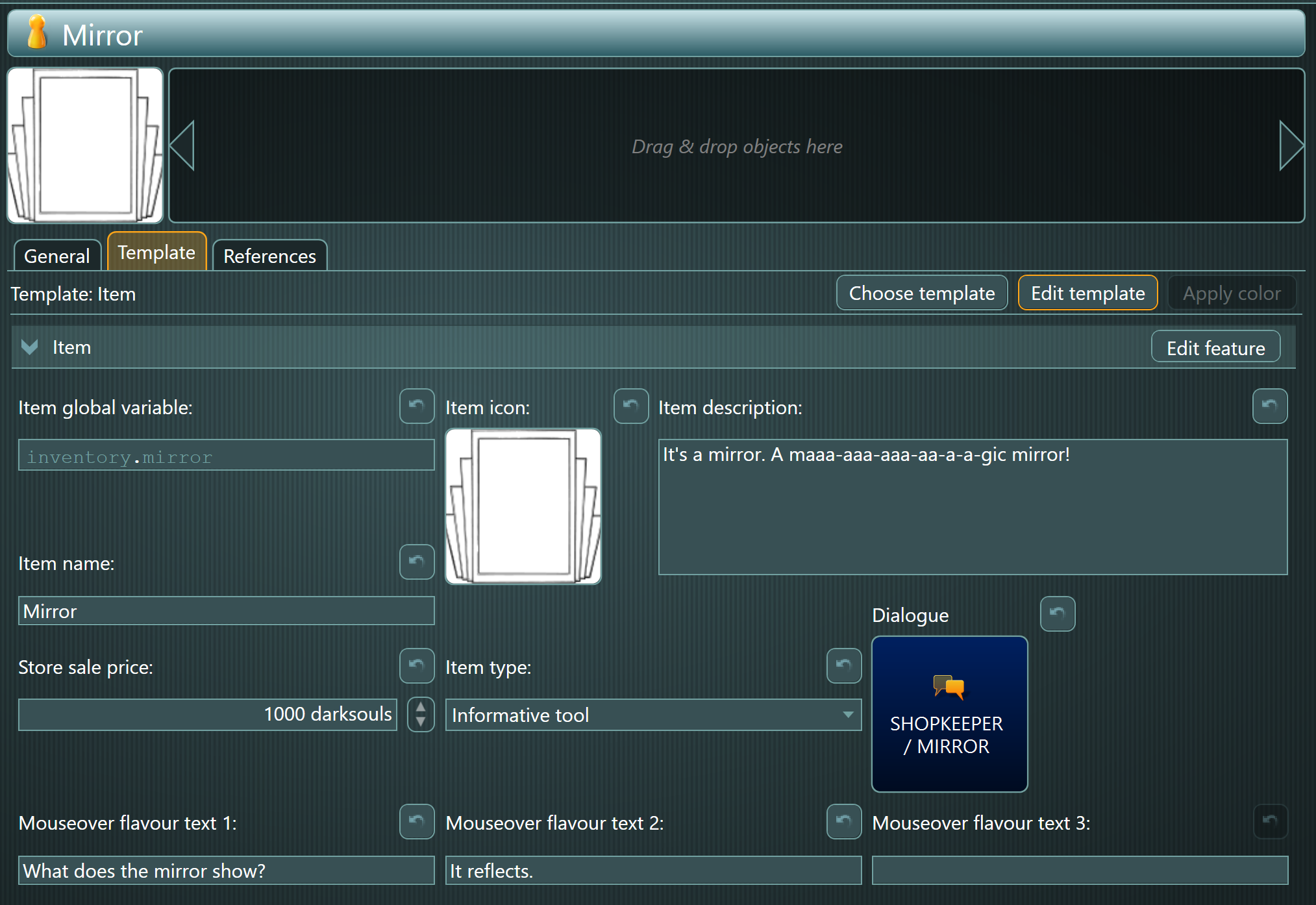
I recommend that everyone get the mirror. It's great. You'll see, pinky promise!
And as I mentioned earlier, your actions in the game WILL have consequences. Even if it's just pissing off your boss. Deliberately.

I hope those of you who managed to reach the end of this piece had a good time reading it :)
We will likely follow up on our content-creating articles about writing (and art, too) later on, as this is just scratching the surface of what we're up to. If you enjoyed this or just want to support our game, consider following us on social media and spreading the word about our game to your friends and family!
As always, you can find us on Facebook, Twitter and Discord :)
Much love!
Death and Taxes
Get Death and Taxes
Death and Taxes
You are the Grim Reaper on an office job. Save the world.. or condemn it to damnation?
| Status | Released |
| Author | Placeholder Gameworks |
| Genre | Simulation, Visual Novel |
| Tags | 2D, Atmospheric, Dark Humor, death, Meaningful Choices, Narrative, Story Rich, watercolor, weird |
| Languages | English |
| Accessibility | Color-blind friendly |
More posts
- Hats & SpanishJul 30, 2024
- Death and Taxes: Now in More Languages than Before <_<Mar 17, 2023
- Released a free Death and Taxes Coloring Book! (download here)Mar 18, 2022
- Death and Taxes @ IWOCon 2021!Mar 28, 2021
- Death and Taxes Anniversary FATE BODY PILLOW Raffle!Feb 16, 2021
- First Anniversary and Brazilian Portugese localization release!Feb 15, 2021
- Death and Taxes - Best Estonian Game of 2020!Jan 18, 2021
- Halloween Update Update and Winter Sale!Dec 23, 2020
- Death and Taxes in Top 100 for IndieDB Indie of the Year!Dec 11, 2020
- WHAT IS HAPPENINGNov 26, 2020
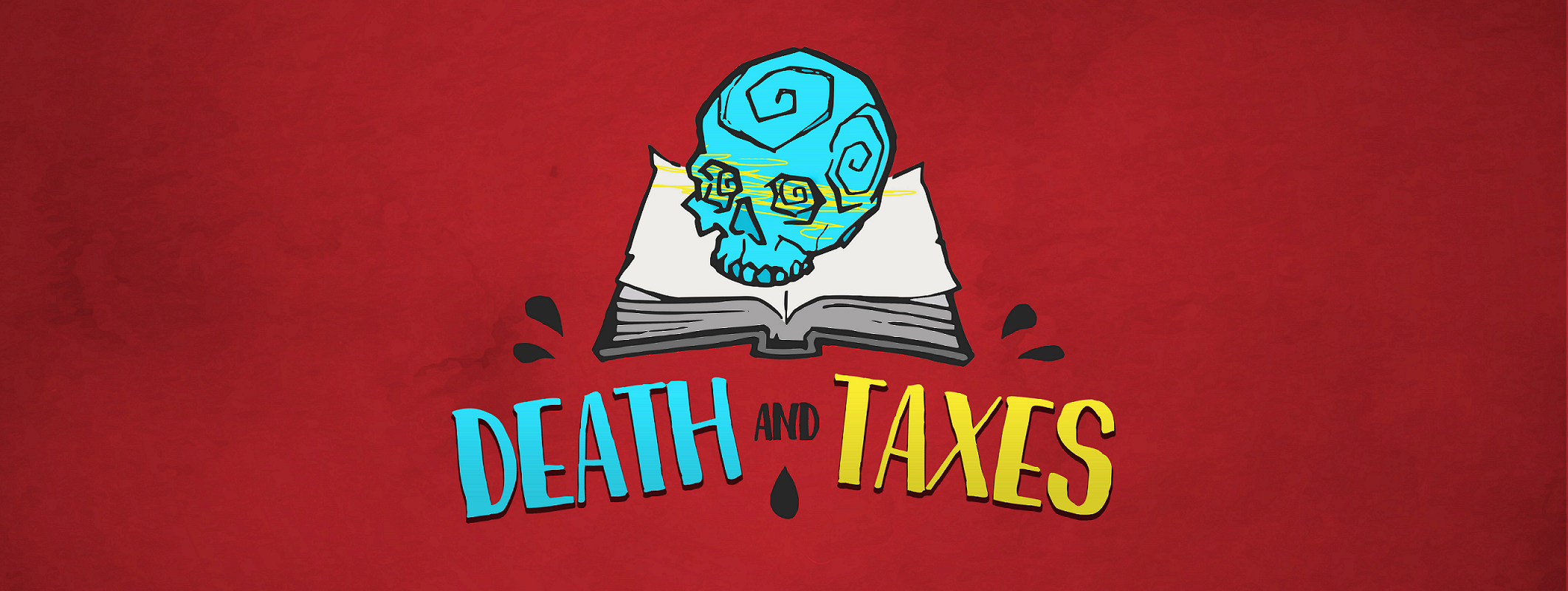
Leave a comment
Log in with itch.io to leave a comment.